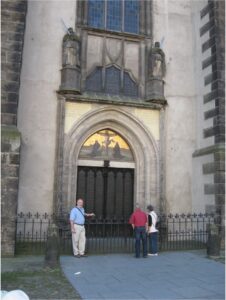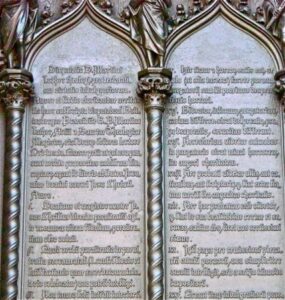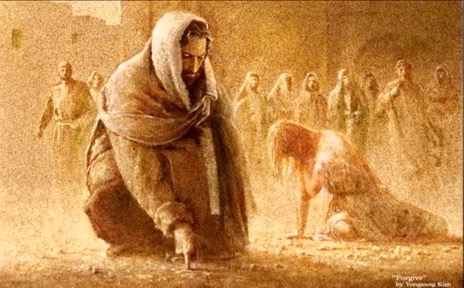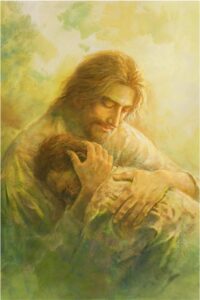A sermon preached at Southminster Presbyterian Church, October 31, 2021
John 8:31-36
“Out of love for the truth and from desire to elucidate it, the Reverend Father Martin Luther, Master of Arts and Sacred Theology, and ordinary lecturer therein at Wittenberg, intends to defend the following statements and to dispute on them in that place. Therefore, he asks that those who cannot be present and dispute with him orally shall do so in their absence by letter. In the name of our Lord Jesus Christ, Amen.”
This is a translation of the heading of a list of 95 propositions that, tradition tells us Martin Luther posted on the door of the castle church in Whittenburg Germany on this date in 1517. In honor of that event protestant churches around the world celebrate the last Sunday in October as Reformation Sunday.

These aren’t the original doors. The original wood doors were replaced in 1858 by bronze doors with the 95 theses engraved on them. Here’s a close-up of the engraving.

Also, tradition has it that this is the appropriate Sunday for those of us of Celtic descent to wear our kilts. I don’t have a kilt (count your blessings) But I am celebrating the day by wearing this stole in the Marshall tartan.
Now back to Luther.
First, Luther’s so called 95 theses were not an attack on the established church. That would come later. Rather, they were propositions that were to serve as a basis for discussion and debate. In short, he had no intention of establishing a new religion, a new denomination, a new branch of the faith. He saw the need for reform and the items on his list were a way of beginning discussion about what that reform should look like and, possibly, a means of recruiting like-minded people to the reform cause. The document was actually titled; “Disputation on the Power and Efficacy of Indulgences.”
To understand what was going on we need to talk a bit about indulgences. The practice in the church at that time was for the penitent parishioner to confess to the priest and receive some form of penance. The process of penance involved satisfaction— paying the temporal penalty (time in purgatory) for those sins. Under certain circumstances, someone who was truly contrite and had confessed his sins could receive partial (or, rarely, complete) remission of this purgatory time by purchasing a letter of indulgence.
The key word, here, is ‘purchasing.’ The sale of indulgences provided a healthy income stream into church coffers at the time when the funds were needed to complete the construction of St. Peter’s Basilica in Rome.
So while Luther didn’t directly attack the idea of indulgences he had quite a bit to say about selling them and abuses that were often associated with their sale.
This forms one of the great themes present throughout the list of propositions.
45. Christians are to be taught that he who sees a needy man and passes him by, yet gives his money for indulgences, does not buy papal indulgences but God’s wrath.
46. Christians are to be taught that, unless they have more than they need, they must reserve enough for their family needs and by no means squander it on indulgences.
The other theme present had to do with works of mercy and love:
41. Papal indulgences must be preached with caution, lest people erroneously think that they are preferable to other good works of love.
43. Christians are to be taught that he who gives to the poor or lends to the needy does a better deed than he who buys indulgences.
44. Because love grows by works of love, man thereby becomes better. Man does not, however, become better by means of indulgences but is merely freed from penalties.
Finally, Luther turns to Grace:
36. Any truly repentant Christian has a right to full remission of penalty and guilt, even without indulgence letters.
37. Any true Christian, whether living or dead, participates in all the blessings of Christ and the church; and this is granted him by God, even without indulgence letters.
62. The true treasure of the church is the most holy gospel of the glory and grace of God.
The ‘true treasure of the church’ is the Gospel, Not the pope How interesting
At the core of Luther’s propositions were two fundamental concepts:
- That the Bible is the central religious authority and
- That humans may reach salvation only by their faith and not by their deeds.
These two ideas became the truths at the basis of protestant theology, and they persist even today.
That’s all well and good for those intending to engage in deep theological discussion. But what does it mean for the rest of us? Why does it matter that the Bible is our authority Our ‘true treasure’?
It’s important to remember that Luther lived in a time and world where religious authority was held by the pope and distributed through bishops to priests (and others given specific authority for specific tasks – like selling indulgences). So, when Luther claimed that the ultimate religious authority was the Bible itself, he was challenging the entirety of the structure of the church.
Further, the only Bibles generally available at the time were hand-written documents in Latin. Gutenberg had invented his movable type printing press almost 80 years prior, but printed Bibles were not yet widely distributed. Often, even the parish priest couldn’t read and understand the Holy text.
We, however, have the dual advantage that we can read the Bible and that it has been translated into English. Which is why this morning’s scripture text is so abundantly clear and understandable.
We’ll leave, for a minute, Luther and the 95 theses and turn to that abundantly clear scripture text.
Throughout his gospel John makes it a practice of referring to “the Jews” as those who don’t believe in Jesus and who ultimately seek to have him killed. “The Jews” are John’s bad guys. So it’s significant that this text identifies Jesus’ audience as “…the Jews who had believed in him.” These aren’t the bad guy Jews, they’re the good guy Jews – even if by the end of chapter 8 they’ve picked up stones to throw at Jesus. Jesus has come to Jerusalem and is seated, teaching in the treasury courtyard of the Temple. His teaching was compelling and many among the audience believed in him. This is the only time these ‘Jews who believed’ show up in the Gospels. They certainly aren’t around when he is arrested, tried, crucified – or if they are they keep a safe distance. But for now, they are eager for more information – which leads Jesus to pronounce “If you continue in my word, you are truly my disciples; and you will know the truth, and the truth will make you free.”
I’m a bit baffled by their response. By claiming Abraham as their ancestor, they assert that they have never been slaves to anyone. Perhaps they’ve forgotten about Egypt and the Exodus. Perhaps these Jews chose to ignore the fact that they were living in an occupied land and while they weren’t technically slaves, it would be a significant stretch to say that they were free.
Of course, Jesus wasn’t talking about freedom from the Romans. He was talking about another kind of freedom, freedom from sin, salvation by faith. “If you continue in my word…”
It’s pretty clear that John doesn’t record the entirety of Jesus’ teaching in this instance. But from what we do have we get some hint about what this might be referring to.
It’s interesting that Chapter 8 begins with ‘the scribes and the pharisees’ bringing a woman caught in adultery for Jesus’ judgement.

Of course, they are doing this to test him – to trap him into contradicting the ‘Law of Moses’ which clearly demands that the woman to be stoned to death. This is one of my favorite scenes in John’s gospel. The religions leaders are standing around with this woman who is expecting to be stoned at any moment, while Jesus calmly sits and writes in the dust with his finger. What was he writing? We’re not to know. He pauses long enough to suggest that anyone without sin should cast the first stone, then goes back to his writing. When he eventually looks up again all the accusers have left, and he has this amazing conversation with the woman.
“Woman, where are they? Has no one condemned you?” She said, “No one, sir.” And Jesus said, “Neither do I condemn you. Go your way, and from now on do not sin again.”
His refusal to pass judgement is echoed 4 verses later as he instructs ‘the Jews’;
“You judge by human standards; I judge no one. Yet even if I do judge, my judgment is valid; for it is not I alone who judge, but I and the Father who sent me. In your law it is written that the testimony of two witnesses is valid. I testify on my own behalf, and the Father who sent me testifies on my behalf.”
So whatever conclusion we might draw from Jesus’ statement “If you continue in my word…” it pretty clearly has a component of not judging others, or maybe it’s not judging others any more harshly than we judge ourselves.
I don’t know about you but in my case that leaves a lot of room for grace – grace given to others because of the mountains of grace that I claim for myself. Because (thank you Martin Luther) it certainly isn’t by works that I will merit salvation. And there’s nobody coming around wanting to sell me an indulgence.
And in the end perhaps that’s what Jesus was talking about when he told ‘the good Jews’ “Very truly, I tell you, everyone who commits sin is a slave to sin. The slave does not have a permanent place in the household; the son has a place there forever. So if the Son makes you free, you will be free indeed.”
‘…slave to sin’ or ‘free indeed’ it’s our choice. And the price of this freedom? Continue in Jesus’ word.
Our postlude this morning, and the Offertory you will hear in a couple of minutes are both arrangements of ‘A Mighty Fortress Is Our God’, a hymn that is familiar to many of us. The words to this hymn were written by our friend Martin Luther He begins with a significant measure of assurance; “
A mighty Fortress is our God, A Bulwark never failing. Our Helper he, amid the flood Of mortal ills prevailing.

This is a photo of Dunator castle on the north-west coast of Scotland. I chose it to represent God’s mighty fortress as another way of apologizing for not wearing a kilt today. You see, Dunator is the ancestral home of my clan. Now back to the hymn.
In verse 2 it picks up the theme of salvation by faith, not by works
Did we in our own strength confide, Our striving would be losing, Were not the right man on our side, The man of God’s own choosing. Dost ask who that may be? Christ Jesus, it is he.
Verse 3 introduces the concept of evil (in the guise of devils who seek to undo us), but in the context of God’s ultimate triumph;
The prince of darkness grim, We tremble not for him. His rage we can endure, For lo, his doom is sure. One little word shall fell him.
And there we are, back again, to Jesus’ word.
In the fourth verse Luther picks up on John’s reporting of Jesus instruction to ‘continue in my word.’
That word above all earthly powers,
No thanks to them, abideth. The Spirit and the gifts are ours Through Him who with us sideth.
So, what is that word; that little word that will fell the prince of darkness grim; that word that abides, no thanks to the earthly powers; that word that we are truly Jesus’ disciples by continuing in it; that word that was so central to Luther’s theology that he wrote up 95 propositions attacking the sale of indulgences and in so doing launched the Protestant Reformation?
It’s pretty easy, really. OK, maybe it’s not. I struggled for a bit about what to say here. The explanation could get really long but I’ll try to keep to just the main points. John eventually tells us ‘the word’, but not until chapter 15. Our Presbyterian Book of Order makes it abundantly clear that we Presbyterians hold that Jesus Christ is the Word of God incarnate, and that this Word of God is revealed most fully in Jesus – The Word (John tells us) who became flesh and lived among us.
So the word is Jesus. All we have to do is look to the life, death, and resurrection of Jesus for our guidance. That’s more than one word. Breaking it down gives us even more words: reinterpreting the law and the prophets, healing the sick, welcoming the children, teaching, calling disciples, feeding crowds, calming storm-tossed seas, eating meals with friends and foes alike, sacrificing his life on the cross. That’s way more than one word.
Summarizing a bit to come to just one word, we can eliminate quite a few. Fear certainly doesn’t describe Jesus’ life, nor does it have any place in God’s kingdom or in our work. I’ll say that again. Fear has no place in our work. Scarcity was never even a consideration. Jesus’ message and life consistently demonstrated the abundance to be found in the Kingdom of Heaven. Anger had no place in Jesus’ life or the kingdom. Oh, there were many instances where Jesus could have exhibited anger, but except for the time he turned over the money changers’ tables in the temple anger was notably absent. So, too, was hatred absent. Author Howard Thurman reminds us that “Jesus rejected hatred because he saw that hatred meant death to the mind, death to the spirit, and death to communion with his Father. He affirmed life; and hatred was the great denial.” Then we come to the concept I have labeled: self-centered. If you look at our world today, if you listen to the rhetoric of those who threaten physical violence to election officials, elected officials, school board members, those who oppose mask mandates and vaccine mandates, those who insist on no restrictions of any kind to the right to own and carry guns, what you find is an overriding theme of self-centeredness. Often this rhetoric is couched in terms of ‘freedom.’ But actually it is little more than an exercise in an attempt to live a life without acknowledging any responsibility to others in society.
Some of you may remember that a few years ago I suggested that we all set our phones with a silent alarm to remind us to stop at 3:00 each day and pray for peace. I have changed my alarm, or rather the reminder it carries. Now it instructs me to pray to turn myself outward toward others, that I look to their needs, their values, their lives; that I consider my responsibility to them as much as I consider my own freedom. I encourage you to join me in this practice, the 3:00 prayer to turn our focus outward.
So those are a few words that actually describe the prince of darkness grim rather than Jesus. What one word would stand in opposition to those words? How about Love.

In everything Jesus did and said, even when he was yelling at people or pointing out how wrong we are, he expressed a complete, unconditional, non-judgmental love. This isn’t love that we deserve. As Martin Luther pointed out, It isn’t love that we can ever earn. It is love freely given, ours for the receiving.
When Luther wrote “The Spirit and the gifts are ours.” That’s what he was talking about. When Jesus told the ‘Jews who believed’ to ‘continue in his word’ that’s what he was talking about. And when we come together as a community of faith, supporting each other, caring for each other, sending God’s love to the world, that’s how we ‘continue in His word’ – the word that will ultimately fell the ‘prince of darkness grim.’
Sometimes it seems like darkness is winning. Sometimes we witness the fear, anger, hatred. Sometimes we hear those who preach scarcity over abundance. Sometimes we are confronted by those so self-centered that they seem to have no concept that they live in a society with others who matter. Sometimes it seems like all our efforts are futile. We have a clear vision of a time and a world where Jesus’ life of love is reflected in every facet of our culture. But we can’t see the realization of that dream beyond the negativity that spreads like a disease, constantly seeking to dominate our world.
So here’s my message for you today. Don’t let all that negativity get in the way of your vision. The darkness has never been able to stand in the face of love, and it never will. Its doom is sure. It may not be today or tomorrow, but we live in the faith that it will certainly come. Perhaps the hardest part of all of this is that we don’t often see the results of the love we share. We are, after all, an impatient people. Have patience. It’s a big world with a long dark history. And occasionally, throughout that history there have been glimmers of light, hope, faith in a God who cares deeply for his creation. We are called to be just such a glimmer in this time and place – to make a difference, however small, in the world; to join with saints who have come before and those who will come after in spreading our light, sharing our light, broadly casting our light, our love, to a world sorely in need of a little less darkness.
May it be so, Amen.